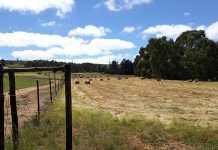Consumers and officials are generally ignorant about the important role farmers play in putting good, wholesome, safe and affordable food on the consumer’s plate. And at the same time farmers are providing lucrative profits for agribusinesses. Misconceptions about the effect of agriculture on the environment also need attention.
Increasing prices
Farmers are frequently blamed for high food prices. However, even a cursory study of agricultural and retail prices will show that food prices usually follow any increase in producer prices, but are very slow in following a decrease in prices.
The producer price of red meat has decreased since the end of 2011 by between 24% and 10%, depending on type and grade. But retail prices of beef, mutton and pork have not decreased to the same extent.
According to Stats SA, beef prices increased sharply up to January 2012. Prices then decreased slightly up to May 2012, but they’re still between 7% and 13% higher than in May 2011. This is while producer prices for A grade beef are at about the same level. Meanwhile, prices for B and C grades are lower. This is just one example of the effect of market power within the value chain on the farmer as ultimate price-taker. Producer prices are decreased if supply grows in relation to demand. The savings processors and retailers gain are reflected in their profit statements and very seldom shared with farmers.
No share
Internationally, agriculture and, more specifically, agribusinesses, have become the flavour of the month for investors. They’re rushing to invest in agriculture, and agro-processing and food companies generally publish very good results. But farmers don’t really share in the good profits enjoyed by processors and retailers. In spite of higher product prices and higher profitability, farm debt increased in 2011, and the terms of trade for agriculture (the ratio between the price of farm produce and the price of farm requisites) weakened further, according to the latest report by the department of agriculture.
Misconceptions
As noted, consumers are extremely ignorant about the farmer’s role in the environment. Negative labels such as ‘factory farms’ for intensive livestock producers and ‘Frankenstein foods’ for GM foods are used. Misconceptions about the benefits of vegetarian and even vegan diets for the environment are bandied about as if these have been scientifically proven. The impression is that if agriculture goes back to more primitive methods of farming, all will be well, and we’ll save the environment. The fact is that subsistence farming will never be able to feed the fast growing global population. And the carbon footprint of extensive production methods is generally much larger than the footprint for intensive production.
Lower
As US expert on sustainability Prof Jade Capper points out: the US bison population had a larger carbon footprint in the 1800s than the current US beef population. Lower profit margins lead to more intensive farming methods. This will lower agriculture’s carbon footprint, while at the same time managing to feed the growing population from the estimated 3% of the earth’s surface suited to food production.
Agriculture’s role in South Africa’s economy is also under-estimated. Its 3% share of the gross domestic product isn’t a true indication of the real role it plays in the economy. If you include forward and backward linkages, agriculture’s total impact can be as high as 30% or more.
Debunking
How can we correct these misconceptions? Farmers and producer organisations should put forward the case for agriculture at every opportunity they get. Maybe even our minister of agriculture can say a few positive things about farmers from time to time. Earl Butz, a former US secretary of agriculture, used to address consumer groups with a loaf of bread in his hand. He’d cut off the two crusts and hold them up, saying: “This is the part the farmer gets. Now let’s talk about food prices!”
Agribusinesses rarely say anything about the important role farmers play in their profits. When government criticises farmers for some spurious reason, they remain silent instead of using their high profile to put the case for agriculture.
For example, why is it that only organised agriculture responds when farmers are accused of mistreating their workers?
Dr Koos Coetzee is an agricultural economist at the MPO. All opinions expressed are his own and don’t reflect MPO policy.
Contact Dr Coetzee at [email protected]. Please state ‘Global farming’ in the subject line of your email.



